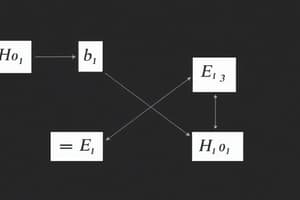Podcast
Questions and Answers
Which logical operator is used to denote negation?
Which logical operator is used to denote negation?
- ∧
- ∨
- →
- ¬ (correct)
The conjunction operator (∧) is true if both propositions are false.
The conjunction operator (∧) is true if both propositions are false.
False (B)
What is the definition of a disjunction?
What is the definition of a disjunction?
The disjunction of propositions p and q, denoted by p ∨ q, is true when at least one of the propositions is true.
In a conjunction, both statements must be ______ for the entire statement to be true.
In a conjunction, both statements must be ______ for the entire statement to be true.
What logical connective is represented by the symbol →?
What logical connective is represented by the symbol →?
What is the truth table for a conjunction?
What is the truth table for a conjunction?
Flashcards are hidden until you start studying
Study Notes
Compound Propositions
- Comprise two or more propositions linked by logical connectors.
- Enable the creation of new propositions using existing ones.
Logical Operators/Connectives
- Functions to form new propositions from multiple existing propositions.
- Precedence order of logical operators includes:
- Negation (¬)
- Conjunction (∧)
- Disjunction (∨)
- Implication (→)
- Biconditional (↔)
Negation
- Represents the opposite of a given statement.
- Forms a new proposition from a single proposition.
- Truth table indicates:
- If p is true (T), ¬p is false (F).
- If p is false (F), ¬p is true (T).
- Example:
- p: "Azam is a doctor."
- ¬p: "Azam is not a doctor."
Conjunction
- Defines the logical "and", denoted as p ∧ q.
- True only when both propositions p and q are true; false otherwise.
- Truth table shows:
- T ∧ T = T
- T ∧ F = F
- F ∧ T = F
- F ∧ F = F
- Example:
- p: "Rebecca’s PC has more than 16 GB free hard disk space."
- q: "The processor in Rebecca’s PC runs faster than 1 GHz."
- Conjunction p ∧ q: Both conditions must be true.
Disjunction
- Represents the logical "or", denoted as p ∨ q.
- False only when both propositions p and q are false; true otherwise.
- Truth table indicates:
- T ∨ T = T
- T ∨ F = T
- F ∨ T = T
- F ∨ F = F
- Example:
- p: "Rebecca’s PC has more than 16 GB free hard disk space."
- q: "The processor in Rebecca’s PC runs faster than 1 GHz."
- Disjunction p ∨ q: At least one of the conditions must be true.
Studying That Suits You
Use AI to generate personalized quizzes and flashcards to suit your learning preferences.




